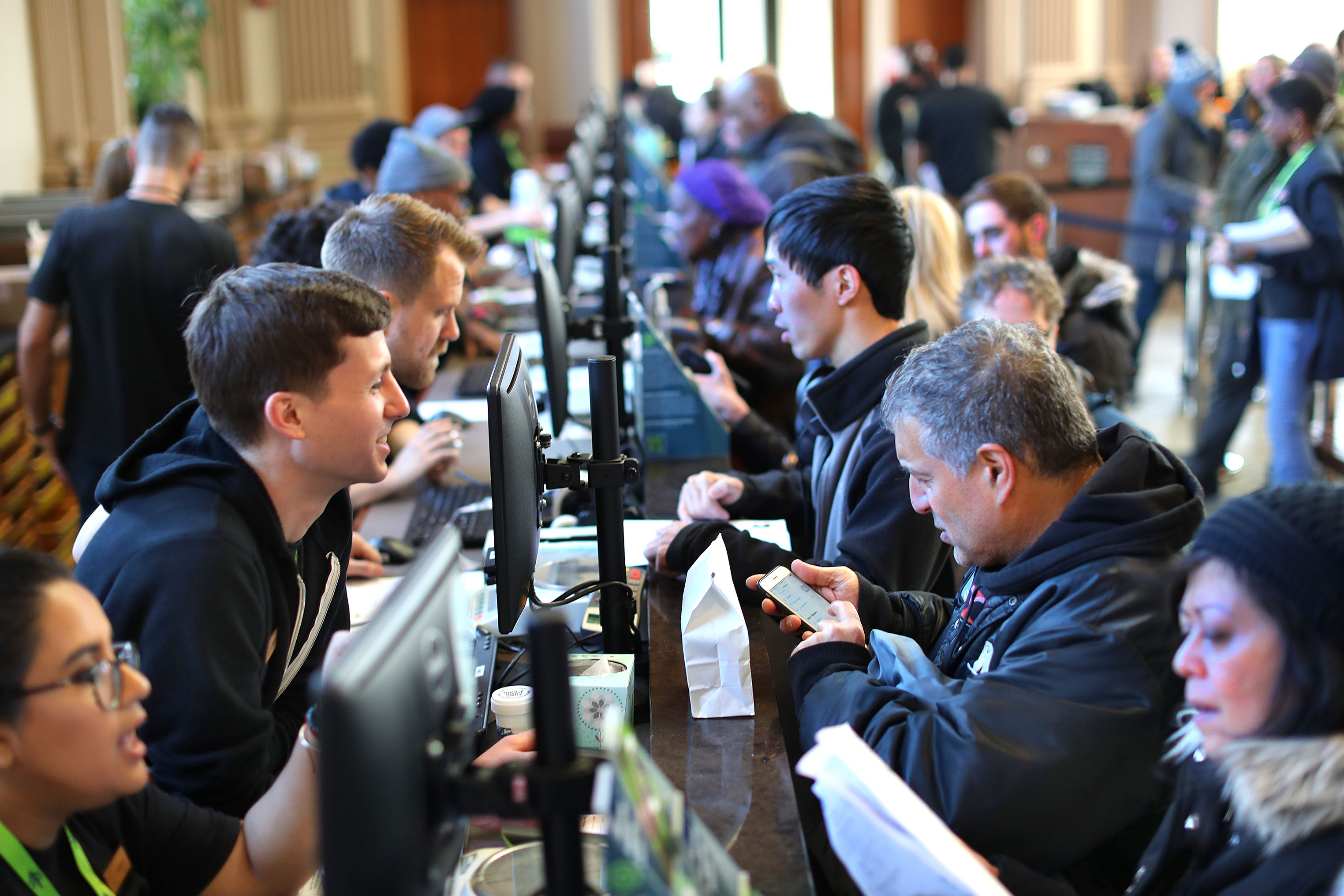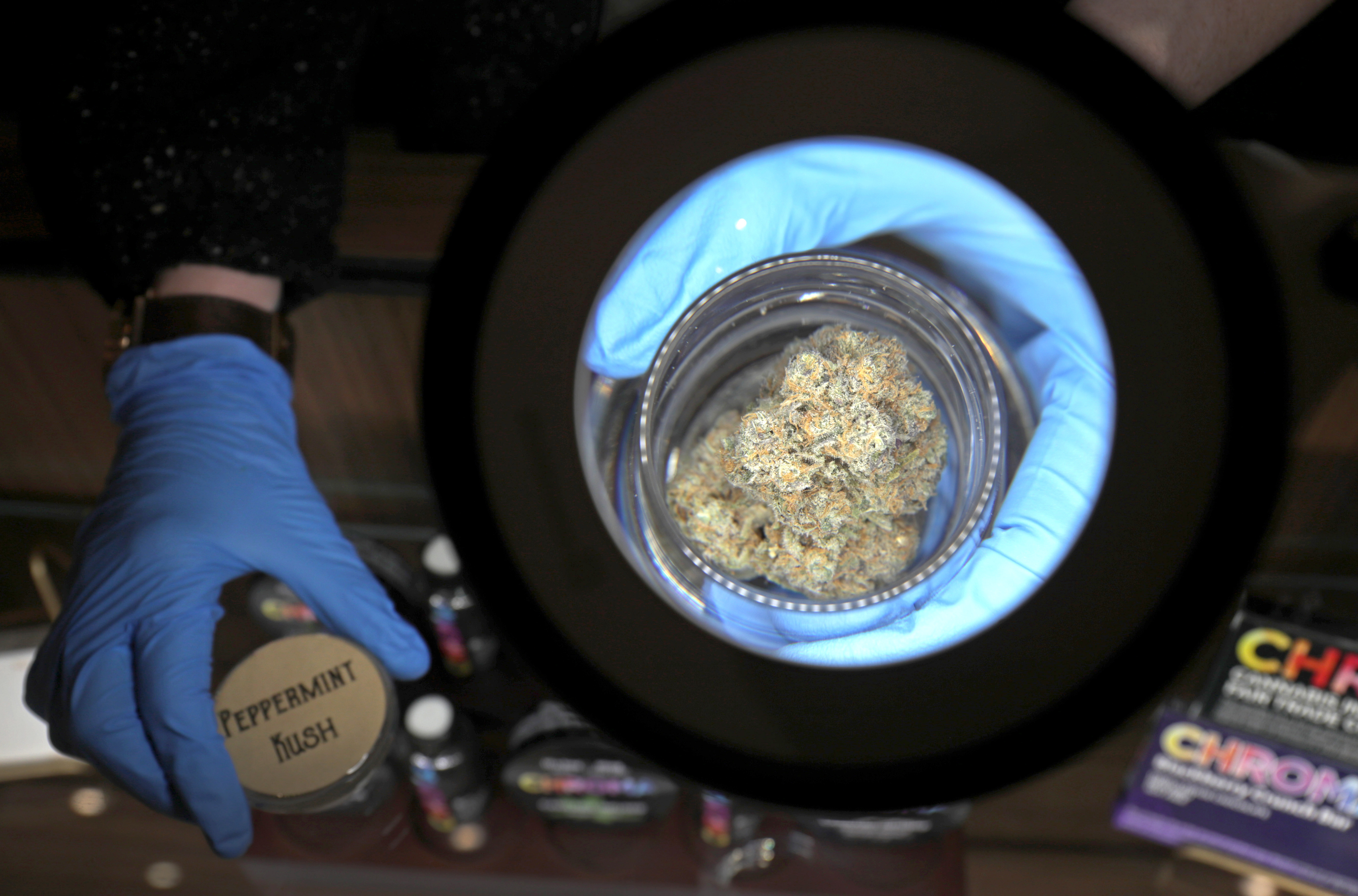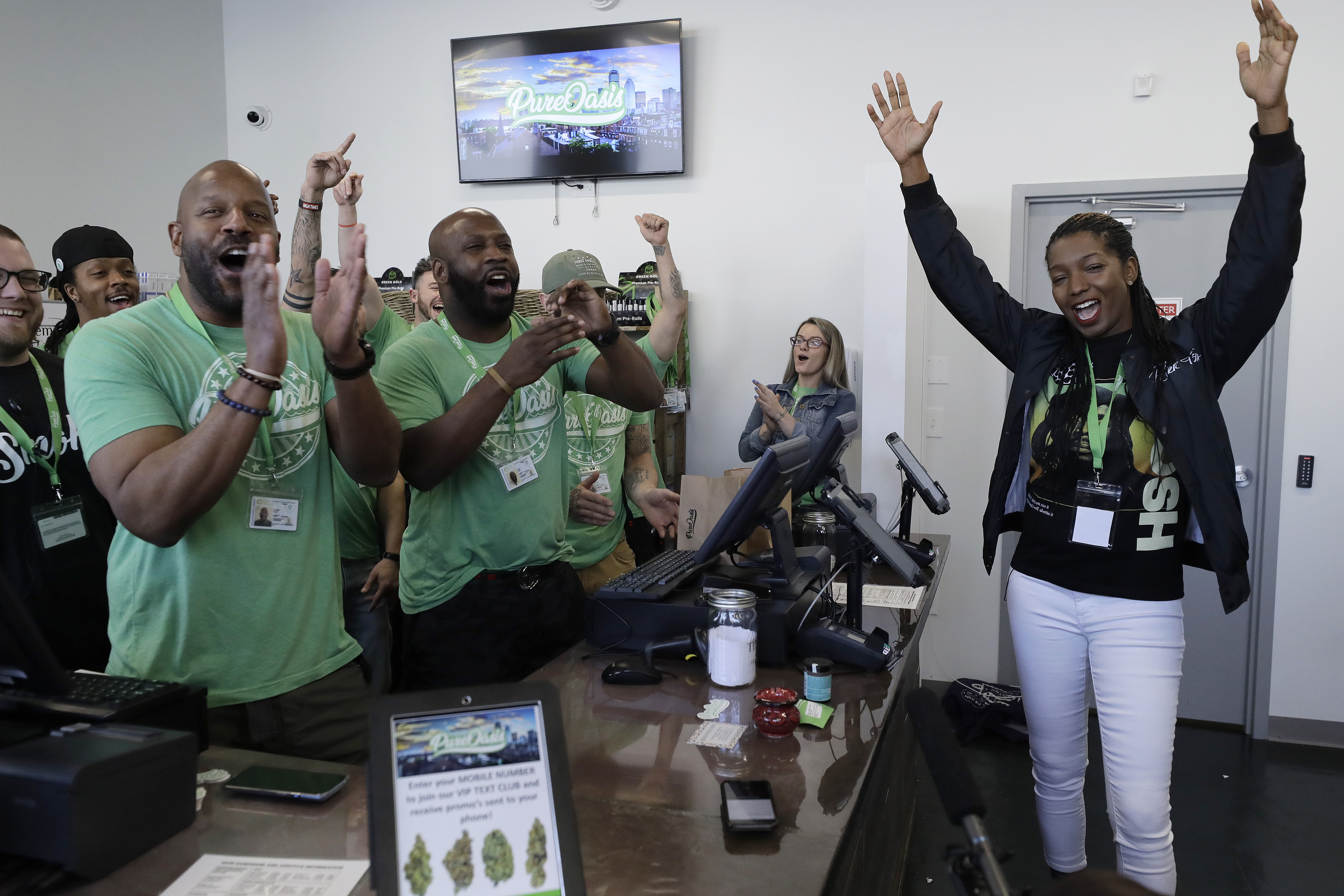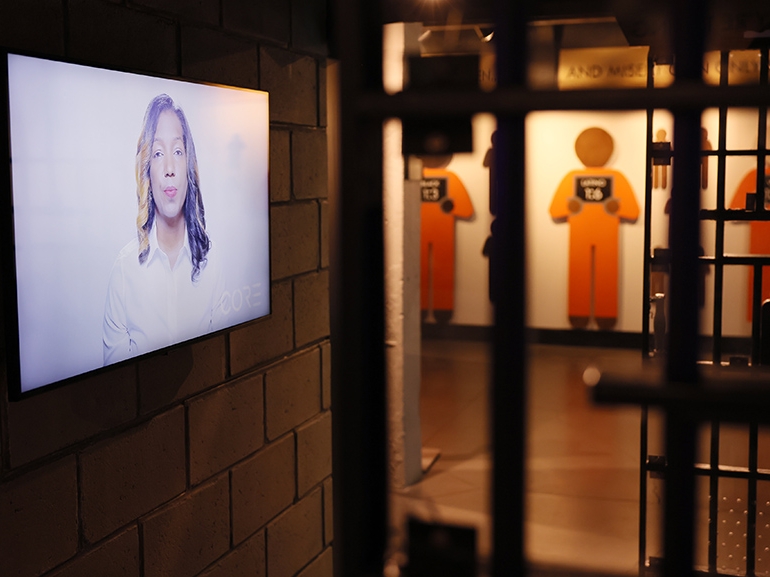Nonetheless, legalization right here is falling in need of its potential in a number of methods, based on interviews with dozens of consultants. Since rewriting the voter-approved poll initiative in 2017, the Legislature has did not replace state legal guidelines governing native management and fairness in order that they replicate the fact — and never simply the thought — of authorized hashish.
Two areas specifically have drawn the loudest requires reform: the blurry limits on how a lot energy municipalities have over new marijuana companies, and the struggles of Black and brown entrepreneurs to win licenses promised them within the legislation.

As these and other problems fester — together with the persistence of a giant illicit market — a brand new batch of states pondering legalization more and more see Massachusetts as a cautionary story as a substitute of a mannequin.
“These no-brainer fixes die with no vote yr after yr,” mentioned Shaleen Title, an lawyer who served on the state’s oversight physique, the Hashish Management Fee, and based a drug policy think tank. “After some time it’s simply unhappy, as a result of the general public may very well be getting higher outcomes throughout the board” from legalization.
“A lot-needed readability”
A single, stark scene from 2019 most likely defines, for some, the story of legalization in Massachusetts: then-Fall River Mayor Jasiel F. Correia II shuffling into federal court in shackles, accused of extorting native marijuana candidates for a whole bunch of hundreds of {dollars} in alternate for metropolis approval.
The type of overt corruption that netted Correia a federal prison sentence is uncommon. However US prosecutors and an array of different consultants level to it as a symptom of the problematic approval system, wherein municipal officers have in depth energy to choose which potential marijuana operators get what’s referred to as a “host group settlement.” With that approval, they’ll transfer on to the state licensing course of. With out it, they need to begin over in one other city. That make-or-break latitude may give native authorities monumental clout — and, within the case of Correia, corrupt alternative.
“Implementing the framework governing the brand new leisure marijuana {industry} has revealed gaps that the Legislature and fee possible didn’t anticipate,” Supreme Judicial Courtroom Chief Justice Kimberly Budd wrote in a July ruling on a lawsuit difficult Salem’s licensing course of. “Closing these gaps would supply much-needed readability.”

The system has allowed municipalities to rake in tens of millions of {dollars} in “group affect charges” from marijuana companies. The funds are referred to as for in host group agreements and are available on high of a 3 p.c native tax on leisure gross sales.
State legislation caps affect charges at 3 p.c of a marijuana facility’s income and says the cash should go towards offsetting prices “moderately associated” to its operation. Nonetheless, solely a handful of cities and cities tailor their charges to an organization’s native side-effects, with most merely charging all native operators the utmost 3 p.c — and some tacking on further charges beyond that.
An industry-funded review of 460 host group agreements earlier this yr by the College of Massachusetts Amherst discovered the offers collectively referred to as for no less than $2.46 million in extreme charges, a complete that doesn’t embody tens of millions extra spent on police details some consider unnecessary.
“Amassing affect charges on high of the three p.c [local] tax is indefensible,” mentioned Caroline Pineau, proprietor of the Stem marijuana retailer in Haverhill, who’s attempting in an ongoing lawsuit to power her host metropolis to justify its steep charges. “It’s clear now that we’ve no affect on public security, and it’s time hashish companies cease being held to a double customary.”
Two localities, Northampton and Lee, have dropped their charges, saying the negligible prices of internet hosting marijuana companies don’t benefit charging them greater than liquor shops or different firms to function regionally.
Municipal attorneys argue all of the funds have been agreed to voluntarily by marijuana firms and symbolize good-faith efforts by native leaders to maximise the profit their constituents obtain from companies whose impact stays unsure.
Whereas municipal lobbyists have mentioned they’re keen to barter clearer limits on charges, they oppose laws that might give the hashish fee authority to evaluation host agreements.
“The pending laws would intrude with over 1,000 present contracts,” mentioned Geoff Beckwith, the manager director of the Massachusetts Municipal Affiliation. “These payments will not be solely overreaches, they might create widespread confusion, disruption, and litigation.”
It’s not clear how a lot sway such concerns maintain on Beacon Hill, however to this point, lawmakers haven’t despatched a reform measure to Governor Charlie Baker: The state Senate didn’t take up a neighborhood management invoice passed by the House of Representatives in February 2020.
Requested whether or not the Home would handle the problem within the present legislative session, Speaker Ronald Mariano famous that, whereas the Senate didn’t vote on the earlier invoice, the Home appears “ahead to engaged on host group agreements and different hashish reforms this session.”
In an announcement, Senate president Karen Spilka pushed again on the notion that her chamber has moved too slowly, saying the primary shops opened “simply three years in the past.”
“As with all new legislation — particularly one which legalizes a brand new {industry} — there’s a have to take a cautious have a look at what’s working and what might be improved,” she mentioned.
Spilka mentioned the Senate “might be taking an in depth have a look at host group agreements, social fairness, and computerized expungement of eligible offenses associated to hashish.”
These extra priorities ought to please advocates, who say the state should do extra to make sure folks from Black and brown communities hit hardest by previous marijuana arrests find yourself with a significant slice of the authorized marijuana market.
Up to now, simply 16 of the 194 companies that have successfully opened a marijuana facility are owned by individuals within the fee’s fairness and financial empowerment applications, which offer training and technical help.

These entrepreneurs say their largest impediment is accessing adequate funding, due to banking restrictions pushed by the federal prohibition on marijuana. Municipal gatekeeping can also be an obstacle: Not like the state, cities and cities aren’t obligated to contemplate fairness when awarding pot licenses, and solely a small handful do. Meaning many such candidates by no means get a shot at hashish fee evaluation and approval.
Payments that might steer a portion of marijuana tax income right into a mortgage fund for fairness candidates and require municipalities to no less than take into account fairness have but to cross. Within the meantime, the {industry} continues to be dominated by operators from the preexisting medical marijuana sector, which had no fairness mandate and imposed even greater up-front prices on firms attempting to enter it.
PHOTOS: How a child marijuana plant turns into a weed gummy
“We’ve to compete with Goliath, and Goliath bought a head begin,” mentioned Laury Lucien, an lawyer and guide who has helped information fairness candidates via the licensing course of and likewise co-owns a Worcester marijuana store. “You want an exorbitant amount of cash for actual property, development, attorneys, charges, drawings, engineers, the entire course of — and banks aren’t loaning to marijuana companies.”
Well being worries largely unrealized
Main as much as the 2016 vote, opponents emphasised the private and public well being risks of marijuana.
In 2021, an rising scientific consensus is placing hashish in a extra balanced context than prior to now, tuning out each diehard antidrug warriors who conjure crises out of inconclusive research and pot lovers who too shortly dismiss the drug’s actual harms.
Specialists on one hand more and more see hashish as a comparatively low-risk leisure drug for wholesome adults and likewise as a medication with potential to deal with situations starting from epilepsy to anxiousness.

Then again, substantial proof hyperlinks heavy marijuana use to unfavourable cognitive results in youngsters and younger adults whose brains are nonetheless creating. It additionally appears clear, consultants mentioned, {that a} proportion of hashish customers overuse the drug and discover it laborious to cease; as within the alcohol {industry}, a comparatively small variety of prolific customers account for an outsized share of authorized hashish gross sales.
“With all the pieces we all know now, it’s naive to consider hashish in a one-size-fits-all method,” mentioned Dr. Staci Gruber, a researcher at McLean Hospital whose lab has studied each the long-term dangers and potential advantages of hashish use.
For teenagers, Gruber added, the outdated admonishment “simply say no” needs to be up to date to “simply say not but.”
Legalization does not appear so far to have markedly boosted pot usage by the young, as some had feared. As of 2019, the newest yr for which state-level knowledge can be found from the federal Youth Threat Habits Survey, the proportion of Massachusetts high-schoolers who used marijuana no less than as soon as prior to now month had only slightly ticked up since 2017, from 24.1 p.c to 26 p.c, a statistically insignificant change.
It has been 5 years since Massachusetts residents voted to legalize marijuana for leisure use. We glance again on the winding street that bought us right here.
2016
Voters approve a poll initiative establishing a system of regulated marijuana gross sales and legalizing the possession, consumption, and residential cultivation of restricted portions of the drug.
State legislators rewrite the voter-passed legislation, considerably elevating the tax on leisure pot gross sales and altering how the brand new {industry} might be overseen.
Marijuana shops in Leicester and Northampton open for leisure gross sales, the primary to take action on the East Coast.
Fall River Mayor Jasiel F. Correia II is arrested by federal brokers for allegedly soliciting bribes from hashish firms searching for native approval; he’s later sentenced to 6 years in jail.
2019
Regulators pull marijuana vapes from retailer cabinets for a number of months after an outbreak of mysterious lung sicknesses linked to the units; the circumstances have been ultimately tied to a filler ingredient utilized in some illicit vapes.
2019
The Globe stories that then-US Lawyer for Massachusetts Andrew Lelling has convened a grand jury to research so-called “host group agreements” between municipalities and marijuana operators.
Because the coronavirus pandemic units in, Governor Charlie Baker orders nonessential companies to shut, together with leisure marijuana firms. They reopened six weeks later.
While it remains unclear whether the 176 marijuana stores that have now opened for business in Massachusetts are fueling youth consumption, the experience of other states is telling: The US Substance Abuse and Mental Health Services Administration in October published numbers showing teenage marijuana consumption in 2020 declining beneath 2012 ranges, a interval wherein 15 states legalized the drug. In the meantime, a September study in an American Medical Affiliation journal concluded the impact of legalization on youth use in 10 states was “statistically indistinguishable from zero.”
Nonetheless, critics say too little consideration has been paid to rising marijuana use among young adults. And as highschool educators complain that marijuana use is turning into extra widespread amongst their older pupils, some see extra ominous trends in youth use charges.
“We ignore these pink flags at our personal peril,” mentioned former congressman and anti-legalization advocate Patrick J. Kennedy. “It’s time to confront the fact of an addiction-for-profit {industry} that has been empowered and emboldened.”
In the meantime on the state’s roads, it’s tough to inform whether or not stoned driving is rising, due to an general decline in driving in the course of the pandemic and the shortage of a breathalyzer-like machine that may reliably detect hashish impairment.
However Massachusetts State Police statistics launched to the Globe don’t replicate any dramatic change since pot shops opened: Of the 8,498 arrests and legal summonses issued by troopers for working beneath the affect from Jan. 2019 via mid-Aug. 2021, 83 p.c have been for alleged alcohol-impaired driving. A lot of the remaining 1,036 citations for alleged drug-impaired driving concerned opioids, State Police officers mentioned.
Proponents contend that authorized gross sales to adults 21 and older have superior not undermined public well being: Regulated hashish firms, they argue, provide uncontaminated merchandise containing identified doses of psychoactive THC in childproof packages plastered with well being warnings, and are forbidden from making edibles that enchantment to youth or imitate well-liked meals manufacturers.
“As an alternative of utilizing an unregulated product with God is aware of what in it, my sufferers at the moment are getting marijuana that’s been examined and tracked from seed to sale,” mentioned Dr. Peter Grinspoon, a Harvard Medical Faculty teacher and hashish professional. “And because it’s not unlawful anymore, they’re way more open with us [physicians] about their [marijuana] use, so we are able to counsel them concerning the dangers of dependency, drug interactions, bronchitis, and so forth.”
Nonetheless, many customers nonetheless choose the illicit market: In 2020, analytics agency BDSA estimated, a whopping 68 p.c of Massachusetts marijuana gross sales occurred underground. Specialists and customers say that’s principally attributable to excessive dispensary costs, brought on partially by tight laws. The authorized market is predicted to proceed gaining floor, nonetheless, as competitors amongst licensed companies will increase.
“To be sincere, we haven’t lower into the illicit market to the extent I’d hoped,” mentioned Jim Smith, a former state consultant whose law and lobbying firm represents quite a few hashish operators. “There’s this entire different invisible multibillion greenback world that’s nonetheless on the market.”
When the primary marijuana shops opened in Leicester and Northampton in November 2018, lines of cars from across the area clogged roads in residential neighborhoods.
The issue turned out to be comparatively short-lived, nonetheless, as extra shops opened and absorbed the demand. As we speak, most municipal officers say the marijuana firms of their communities have been good neighbors.
“It has actually been a optimistic factor for town,” mentioned Alex Morse, the previous mayor of Holyoke, the place seven marijuana firms have opened for enterprise and extra are within the queue.

Employees ready to open the SEED marijuana retailer for the day. The shop hosts a Social Justice Hashish Museum, which can also be used as a group house. (Jessica Rinaldi/Globe Employees)

A video of Niambe McIntosh talking about her brother’s incarceration was projected inside a mock jail cell at SEED’s Social Justice Hashish Museum. (Jessica Rinaldi/Globe Employees)
That’s thanks partially to advertising and marketing laws that stop retailers from, amongst different conspicuous techniques, displaying merchandise of their home windows and utilizing marijuana-leaf logos.
Equally, tight safety measures have helped be certain that an isolated robbery attempt and opportunistic looting are amongst only a small handful of main safety incidents identified to have hit the {industry} to this point.
And powerful municipal management over siting has given native officers energy to stop clusters or strips of pot shops — as envisioned by one dystopian anti-legalization TV advert.
Amid optimistic opinions from Holyoke and different “early adopter” communities, the variety of municipalities with short-term or everlasting bans on marijuana firms has fallen from 189 in 2018 to 124.
“From a public security or annoyance perspective, it’s been just about silent,” mentioned Arlington’s city supervisor, Adam Chapdelaine, whose group reversed an earlier moratorium on marijuana shops.
That evolution continues to be taking place too slowly for a lot of. Whereas Spilka’s assertion suggests modifications to the state’s legalization legal guidelines may quickly transfer ahead, advocates aren’t holding their breath.
Mentioned Lucien, the lawyer and Worcester pot store proprietor: “There’s this lingering stigma round marijuana that provides politicians an excuse to pull their ft.”
Dan Adams might be reached at [email protected]. Observe him on Twitter @Dan_Adams86.











